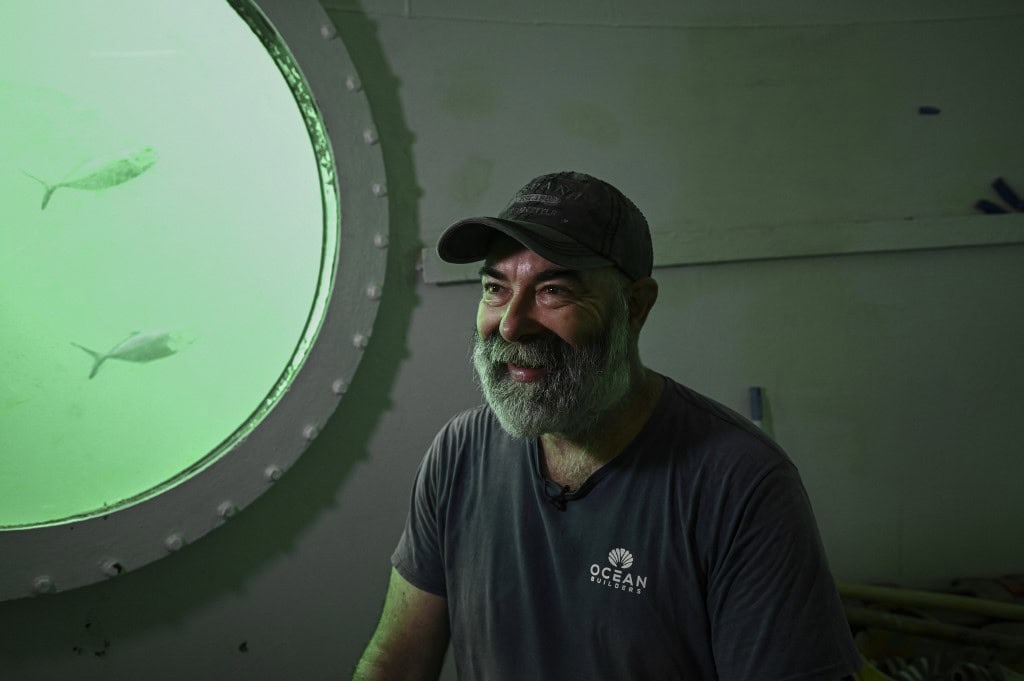At a depth of 11 meters off the coast of Panama, German aerospace engineer Rüdiger Koch has been living for two months in a capsule attached to a futuristic house built over the waters of the Caribbean Sea. With his unusual adventure, which he plans to continue for another two months, the 59-year-old aims to set a Guinness World Record and prove that it’s possible to live and work comfortably underwater.
“Moving to the ocean is something we should consider. It’s much more peaceful down here; it’s not like city life. All you hear are the waves and the faint sound of fish,” Koch said to journalists in English from his underwater capsule. The 30-square-meter capsule includes a portable toilet, a bed, a TV, a computer, a stationary bike, and fans. He also has satellite internet and solar power, along with a small generator, but no shower.
“I wake up at six, follow the news, work a bit, and then make breakfast to deal with the daily tasks,” Koch explains. On a small table, he keeps a copy of his favorite book, 20,000 Leagues Under the Sea by 19th-century French novelist Jules Verne.
A fan of Captain Nemo, Koch began his challenge on September 26 and plans to resurface on January 24, aiming to surpass the record for the longest time spent underwater without decompression. The current record is held by Joseph Dituri, who spent 100 days submerged in a habitat in a Florida lake.
Two large digital clocks, each a meter wide, track the days, minutes, and seconds he has completed and how many remain.
Turquoise Windows
The floating house, located near the coast of Puerto Lindo in Portobelo, is accessible by a 15-minute motorboat ride from the Linton Bay marina. The circular house, with 360-degree windows, is mounted on a cylindrical structure. To enter, one must climb a hanging ladder or use a hoist.
Inside, a narrow spiral staircase descends through the cylinder to Koch’s submerged cabin. “It’s not particularly hard. I don’t feel like I’m suffering down here at all, although the hardest part is that sometimes I want to go diving,” he admits.
From the circular windows of his capsule, Koch can see fish of various sizes. “You have a very different view,” he says, with the turquoise waters in the background. Koch notes that the material of the capsule he lives in is environmentally friendly. Its exterior walls are made of a material similar to shells, which can host corals and fish.
A Good Shower
Four cameras monitor Koch to ensure he doesn’t abandon his mission and that everything is going smoothly. Above in the house, Israeli safety expert Eial Berja tracks his movements on a screen. “We’ve had winds, waves, and rainstorms that made it impossible to see anything. We’re alone in the middle of the ocean,” says Berja, who recounted how a recent storm nearly derailed the plan.
Koch receives food from the surface and is visited by a doctor and his two children. “The last time I checked, I was still married,” he jokes about an upcoming visit from his Thai wife. “We decided to go for the Guinness World Record to show the world that it’s possible to innovate and live underwater,” says Canadian Grant Romundt, who co-founded a company with Koch that has already built three floating houses in this part of the Panamanian Caribbean.
Record or not, Koch is clear about the first thing he’ll do when he emerges from his voluntary confinement: “I’m going to take a really good shower—about an hour long.”






